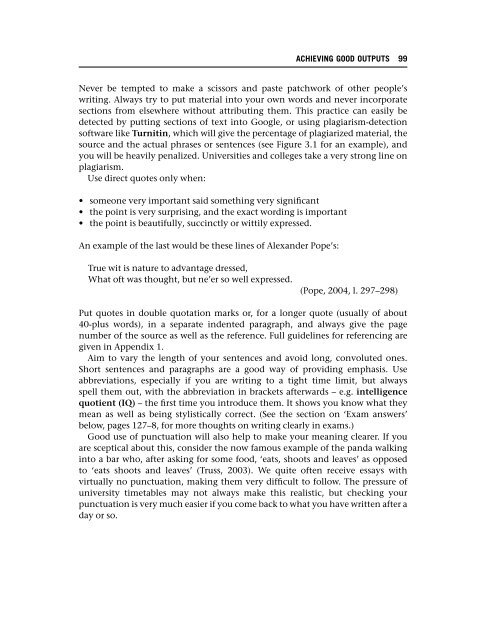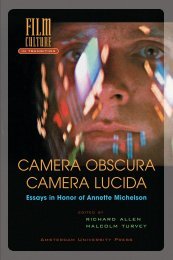Psychology - Forgot your username
Psychology - Forgot your username
Psychology - Forgot your username
Create successful ePaper yourself
Turn your PDF publications into a flip-book with our unique Google optimized e-Paper software.
Never be tempted to make a scissors and paste patchwork of other people’s<br />
writing. Always try to put material into <strong>your</strong> own words and never incorporate<br />
sections from elsewhere without attributing them. This practice can easily be<br />
detected by putting sections of text into Google, or using plagiarism-detection<br />
software like Turnitin, which will give the percentage of plagiarized material, the<br />
source and the actual phrases or sentences (see Figure 3.1 for an example), and<br />
you will be heavily penalized. Universities and colleges take a very strong line on<br />
plagiarism.<br />
Use direct quotes only when:<br />
• someone very important said something very significant<br />
• the point is very surprising, and the exact wording is important<br />
• the point is beautifully, succinctly or wittily expressed.<br />
An example of the last would be these lines of Alexander Pope’s:<br />
True wit is nature to advantage dressed,<br />
What oft was thought, but ne’er so well expressed.<br />
ACHIEVING GOOD OUTPUTS 99<br />
(Pope, 2004, l. 297–298)<br />
Put quotes in double quotation marks or, for a longer quote (usually of about<br />
40-plus words), in a separate indented paragraph, and always give the page<br />
number of the source as well as the reference. Full guidelines for referencing are<br />
given in Appendix 1.<br />
Aim to vary the length of <strong>your</strong> sentences and avoid long, convoluted ones.<br />
Short sentences and paragraphs are a good way of providing emphasis. Use<br />
abbreviations, especially if you are writing to a tight time limit, but always<br />
spell them out, with the abbreviation in brackets afterwards – e.g. intelligence<br />
quotient (IQ) – the first time you introduce them. It shows you know what they<br />
mean as well as being stylistically correct. (See the section on ‘Exam answers’<br />
below, pages 127–8, for more thoughts on writing clearly in exams.)<br />
Good use of punctuation will also help to make <strong>your</strong> meaning clearer. If you<br />
are sceptical about this, consider the now famous example of the panda walking<br />
into a bar who, after asking for some food, ‘eats, shoots and leaves’ as opposed<br />
to ‘eats shoots and leaves’ (Truss, 2003). We quite often receive essays with<br />
virtually no punctuation, making them very difficult to follow. The pressure of<br />
university timetables may not always make this realistic, but checking <strong>your</strong><br />
punctuation is very much easier if you come back to what you have written after a<br />
day or so.






